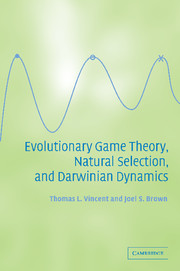Book contents
- Frontmatter
- Contents
- List of figures
- Preface
- 1 Understanding natural selection
- 2 Underlying mathematics and philosophy
- 3 The Darwinian game
- 4 G-functions for the Darwinian game
- 5 Darwinian dynamics
- 6 Evolutionarily stable strategies
- 7 The ESS maximum principle
- 8 Speciation and extinction
- 9 Matrix games
- 10 Evolutionary ecology
- 11 Managing evolving systems
- References
- Index
5 - Darwinian dynamics
Published online by Cambridge University Press: 11 August 2009
- Frontmatter
- Contents
- List of figures
- Preface
- 1 Understanding natural selection
- 2 Underlying mathematics and philosophy
- 3 The Darwinian game
- 4 G-functions for the Darwinian game
- 5 Darwinian dynamics
- 6 Evolutionarily stable strategies
- 7 The ESS maximum principle
- 8 Speciation and extinction
- 9 Matrix games
- 10 Evolutionary ecology
- 11 Managing evolving systems
- References
- Index
Summary
Darwinian dynamics couples population dynamics with strategy dynamics to model the evolutionary process. So far, we have focused on ecological models by using the G-function to express the population dynamics. In this chapter we obtain strategy dynamics using the same G-function by assuming heritable variation as a distribution of strategies around the mean strategy used by each species in the population.
Any theory of evolution that includes natural selection is incomplete, unless it includes both population dynamics and strategy dynamics. The resulting Darwinian dynamics captures the full rich behavior of the evolutionary processes. Its use clarifies two important features of evolutionary stability: resistance to invasion and dynamic attainability (Eshel and Motro, 1981; Eshel, 1983; Taylor, 1989; Christiansen, 1991; Takada and Kigami, 1991; Taylor, 1997).
The concept of a strategy dynamic requires us to deal with issues of mutation, heritable variation, and whether species represent asexual lineages or populations of sexually interbreeding individuals. The strategy ui of a species is no longer considered fixed. Rather, it describes a population's mean strategy value that contains some variability in value among the individuals of the population. The introduction of strategy dynamics with the population dynamics leads to a new time scale. In addition to the ecological time scale there is now an evolutionary time scale. Because population dynamics and strategy dynamics may occur on different time scales, it is useful to make this distinction. We will show that population dynamics generally, but not always, occur on a faster time scale than strategy dynamics.
Information
- Type
- Chapter
- Information
- Publisher: Cambridge University PressPrint publication year: 2005
Accessibility standard: Unknown
Why this information is here
This section outlines the accessibility features of this content - including support for screen readers, full keyboard navigation and high-contrast display options. This may not be relevant for you.Accessibility Information
- 1
- Cited by
